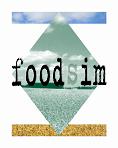 |

|
The development and use of model simulation in risk analyses, food safety, fermentation, texture and flavour of food products. How simulation models can help to manufacture a consumer-friendly food product on specs with a shorter time-to-market.; The state-of-the-art in modelling of complex food properties. This translates itself into the use of models in process and plant control. Process control based on a set of product specs by application of neural networks, fuzzy logic, cost models and mechanistic models; traceability and logistics management. These aspects are covered by the following:
Modelling and Simulation in Food Engineering and Processing
The objective of this research track is to assess the state of art of computer modelling and simulation in food processing and engineering. Themes focusing on computer modelling and simulation applications conducted with the objective of improving knowledge and understanding on physical phenomena, developing software sensors and optimising systems, are greatly well-advised to be presented. Therefore, this theme is concerned with different applications, such as:
- Optimisation of the design of a unit operation or process (including thermal and non-thermal processes)
- Optimisation of the operating conditions
- Optimisation of products (formulation)
- Real time simulation and control
- Indirect measurement, observation and estimation techniques (software sensors)
- Estimation of thermophysical properties by inverse techniques
- Condition based monitoring, Failure analysis
 Submit your paper/abstract proposal for the food engineering here
Submit your paper/abstract proposal for the food engineering here
Simulation in Food Sciences and Biotechnology
Computer modelling and simulation methods offer imaginative possibilities for studies in food sciences and biotechnology. Extraction yield or quality of final products, biokinetic studies, molecular investigations, bioprocess control, and risk assessment, beyond other areas, can be improved by using those approaches.
Possible topics to be discussed:
- Simulation and molecular structure
- Biomolecular engineering
- Biotechnology
- Biokinetics modelling
- Bioprocess control
- Growth and death modelling
 Submit your paper/abstract proposal for the food sciences here
Submit your paper/abstract proposal for the food sciences here
Methods and tools applied to Food and Bio-industries
This theme concerns itself with the methodological aspects of simulation modeling covering Systems analysis, model specification and evaluation, sensitivity analysis, statistical models, metamodels, etc., applied to Food and Bio-industries. Problems of software tools also will be addressed within this theme.
Possible topics to be discussed:
- Software development
- User friendly interfacing
- Web-enabled applications
- Commercial modeling tools applications
- Innovation in sensors (including low-cost on-line sensors)
- Robotic solutions for food
- Dynamic modeling of food industry systems
- Model-Driven Architecture approach (MDA)
- Simplification of complex models (for control or real time simulation)
- Neural networks (for modelling, control or computing)
- Fuzzy techniques (for simulation or control)
- Expert Systems
 Submit your paper/abstract proposal for the methods and tools track here
Submit your paper/abstract proposal for the methods and tools track here
Methods and tools applied to Food Quality and Safety Evaluation
The objective of this research track is to assess the state of art of computation programs developed to evaluate food quality and safety, in order to assist food companies to achieve the level of product security and customer confidence appropriate to their situation.
Examples of areas of interest to be discussed:
- Computation tools developed to assure quality solutions in relation to microbiological and chemical contaminants, food additives and processing toxicants;
- Traceability solutions to food industries;
- Computation systems applied in food risk assessments (including predictive Microbiology);
- Real-Time Vision-Based Food Inspection Systems;
- Image processing and analysis applied to quality inspection and/or safety evaluation;
- Modelling/Predicting of food shelf-life;
- Food packaging;
- Sensory analysis
 Submit your paper/abstract proposal for the food quality track here
Submit your paper/abstract proposal for the food quality track here
Simulation in Functional Foods
Functional Foods are known for providing a health benefit beyond basic nutrition. In the last years, consumers are increasingly concerned with their health and wellness, and are demanding food products with associated health benefits. Due to the growing awareness of nutrition's role in maintaining health and preventing diseases, the market for functional foods is expected to grow.
The main objective of this research theme is to cover the aspects related with the issue of bringing functional foods to market.
Examples of areas of interest to be discussed:
- Designing Functional foods
- Developing and marketing of functional foods
- Modeling human gastrointestinal tract
- Viability analysis of probiotic bacteria
- Functional food technology
 Submit your paper/abstract proposal for the functional foods track here
Submit your paper/abstract proposal for the functional foods track here
Simulation in Food Production Management, Economics and Traceability
Concerns about food safety and quality gave rise to legislation on the traceability control and labeling of food products. Labeling legislation assures that foods are properly described, in order to give guarantees to consumers and protect food industries. European Union introduced mandatory traceability and relevant labeling (General Food Law 178/2002/EC), thus all food operators must have a traceability system. Special attention must be paid on the traceability of food products with quality labels (Protected Designation of Origin and Protected Geographic Indication) with added market value.
Another aspect to be considered is the fact that, nowadays, firms in the food industry often face short delivery delays mandated by marketing requirements. Food products are frequently perishable and firms in the industry need to react quickly within a flexible organization. Thus, this theme also concerns the variety of research efforts addressing intra-firm and inter-firm economic and management problems across food chains.
Applications in the following subjects are welcome:
- Production and operation management;
- Scheduling and logistics problems;
- Supply chain management;
- Efficient Consumer Response;
- Micro economics and industrial models;
- Quality management;
- Human resources management;
- Marketing and strategy;
- Trade marketing;
- Sales forecasting;
- Information systems;
- Traceability
 Submit your paper/abstract proposal for the food production track here
Submit your paper/abstract proposal for the food production track here
Sustainable Food Production
Sustainability has become an issue widely debated, being a value which has to be maintained throughout the food supply chain. The objective of this research track is to cover aspects related with the issue of sustainable food production.
Examples of areas of interest to be discussed:
- Sustainable food production practices/production efficiency
- Energy sustainability
- Environmental efficiency
- Sustainable Impact Assessment (SUIA)
- Development of intelligent decision support systems
- Life cycle assessment methodologies and programs
- Food chain management
- Food security and sustainability
- Sustainability and market
- Sustainability concept seen from the consumer standpoint
- Integrated farming standards and food eco-labelling
 Submit your paper/abstract proposal for the sustainable food production track here
Submit your paper/abstract proposal for the sustainable food production track here
Innovation in Traditional Food Products
In European countries, traditional food products constitute an important element of culture and heritage, simultaneously contributing to the development and sustainability of rural areas. Generally, those products are perceived by consumers as products with regional identity and high sensory quality, consequently attaining higher commercial value. Due to an increased demand for traditional food products, innovative solutions are needed for this specific sector resulting in a great need to carry out research in this field.
Works focusing in all aspects concerned with innovation in traditional food products, namely, innovation on their production, marketing, etc., with priority to computational studies performed with the objective of attaining surplus value are greatly well-advised to be presented.
 Submit your paper/abstract proposal for the traditional foods track here
Submit your paper/abstract proposal for the traditional foods track here











